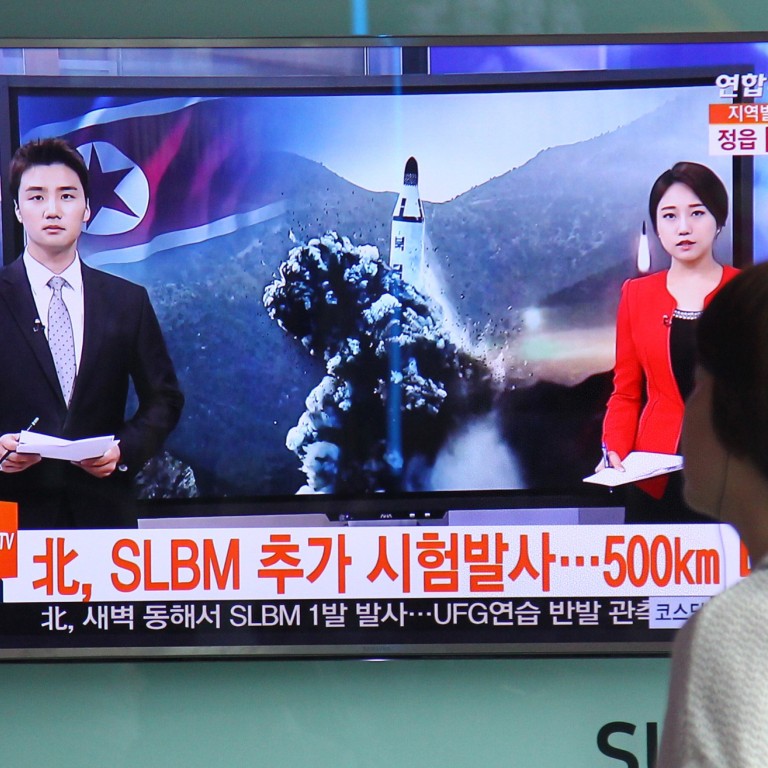
Why the world's superpowers can't stop an aggressive North Korea
US, China and Russia need to work together to stop Pyongyang's escalation, but right now their interests don't coincide, according to research firm
North Korea continues to ignore international warnings following the launch of not one, but two ballistic missiles this month, continuing a streak of frenzied weapons activity so far this year.
The acts, which are in clear violation of United Nations (UN) resolutions, underlined the age-old question of what can be done to stop the rogue nation . The answer is, very little, unless three of the world's superpowers cooperate.
On August 3, Pyongyang test-fired two ballistic missiles, one which landed inside Japan's exclusive economic zone for the first time, while the other one reportedly exploded after launch. Wednesday saw a submarine-launched missile enter Japan's air defense identification zone. The latter launch was strategically timed, taking place during a meeting of Japanese, Chinese and South Korean foreign ministers in Tokyo. It also came two days after South Korea and the US began annual military exercises that North Korea has historically condemned.
August's incidents follow July's firing of three ballistic missiles into the sea , a mid-range missile launch in June, a long-range rocket launch in February and the country's fourth nuclear test in January.
Since the isolation nation first started testing missiles in 1993, it's been a thorn in the sides of South Korea, Japan, the US and, increasingly China. The development and proliferation of Pyongyang's missile industry is viewed as major security threat, not only because of the frequent threats leader Kim Jong Un issues to Washington and Seoul, but because missile technology is linked to the country's nuclear capabilities.
North Korea is believed to possess more than 1,000 missiles of various models, including intercontinental ballistic missiles (ICBMs) that are used to fire nuclear warheads, according to the National Committee on North Korea, a non-partisan research coalition.
Existing UN Security Council resolutions prohibit the country from using ballistic missile technology, "even if characterised as a satellite or space launch," and enhanced sanctions were adopted in March in response to January and February's incidents. The country has been under sanctions since 2006.
Only the US, China and Russia can stop North Korea's recent escalation, according to Michael Ivanovitch, president of research firm MSI Global and a former OECD senior economist. "But that hinges on whether the three superpowers can agree among themselves about the balance, and the political nature, of power on the Peninsula."
For now, that doesn't seem likely.
"Their interests don't coincide. They were on the opposing side of the Korean War and the sequels of that conflagration are still unresolved," Ivanovitch explained. Moscow and Beijing were essential sources of tactical, military and logistical aid for Pyongyang during the 1950-1953 conflict with South Korea, while Washington was an ally to Seoul.
The heated debate about deployment of a US anti-missile defense system, known the Terminal High Altitude Area Defense (THAAD) , in South Korea is a current example of those underlying tensions. Seoul and Washington hope to use THAAD to counter North Korea, but Beijing and Moscow are against the idea, calling THAAD a regional security threat.
The fierce opposition has dampened hopes that China will end Pyongyang's nuclear and missile aggression.
As North Korea's biggest trading partner and main source of aid, Beijing has, however changed its tune in recent years by joining the US in condemning Pyongyang's offenses. "China opposes North Korea's nuclear and missile process, actions that cause tension on the Korean Peninsula," foreign minister Wang Yi said this week, pledging to work alongside his Japanese and South Korean counterparts.
But the THAAD debate indicates China has yet to completely switch sides.
Ultimately, it's possible for the US, China, and Russia to reach a new sanctions agreement that could end North Korean aggression, but the three countries have competing geopolitical interests in the Korean peninsula that would affect the level of commitment and enforcement of the sanctions, Harry Sa, research analyst at Singapore's Nanyang Technological University, summed up.
"The US wants a united Korea that is democratic, capitalist and pro-Western, while China wants North Korea to be a buffer against American presence. Russia would also seek to prevent the US from grabbing such a large foothold in continental Asia," he continued.
The way things stand, the only country that can stop North Korea is North Korea, according to Sa, and he did not forecast a self-tempering by the rogue state.
"Weapons have become sacred to the North Koreans and just as non-negotiable as sovereignty over the South China Sea is to the Chinese," he said.

